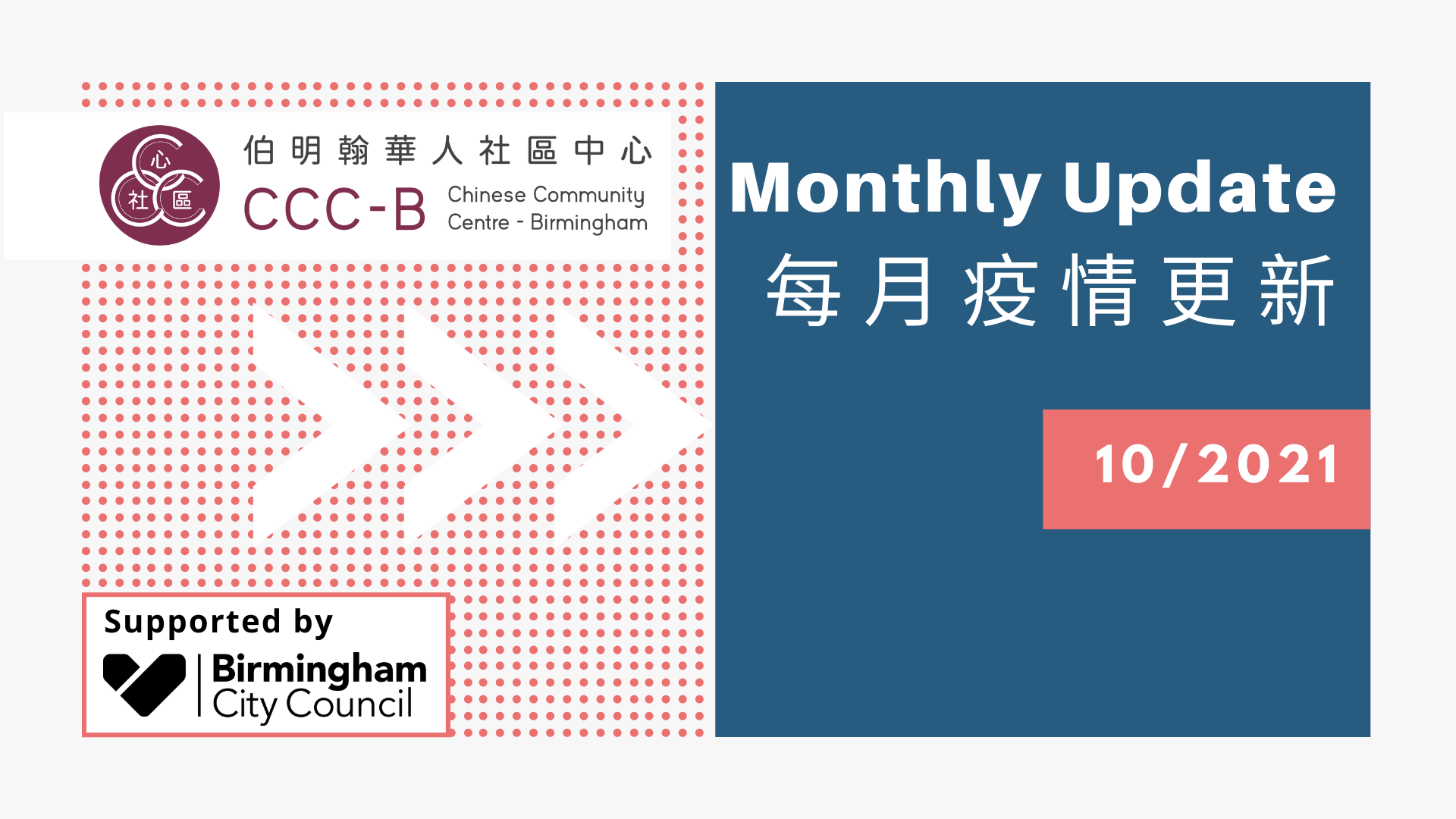I: Roadmap
Infection levels have been rising recently. So far The Government have no agenda to move to its stricter Plan B. The Government’s current focus is to offer booster jabs and get more young people, including 12-15 year olds, vaccinated.
What could trigger Plan B?
No single event or set of figures would necessarily trigger Plan B, but the government said it would monitor:
- hospitalisations
- rapid rates of change in figures
- the overall state of the NHS
Key messages from the Cabinet Office webinar 21st Oct.
- Following safer key behaviours to tackle COVID-19 is vital as winter approaches.
- Get your booster jab as soon as you can, if eligible..
- Myths about the vaccine programme can be misleading and undermine the effort to tackle COVID-19. Let people know the facts.
Current Transmission since schools opened in September:
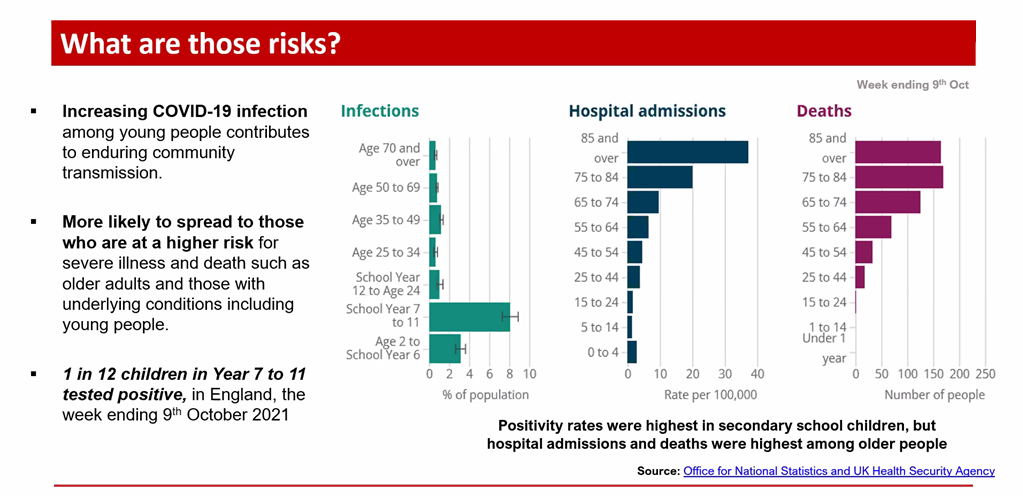
Since school returned, the high rates have been sustained by younger teenagers. In the most recent week, nearly half of cases have been in the under-20s. However, serious illness and hospitalisation is still higher among older people. This means schools and colleges are a vector for transmission but the danger is still young people taking it home and passing it onto older family members.
II. Test and Self-isolation policy
From October 24, eligible fully vaccinated passengers arriving in England from countries not on the red list can take a lateral flow test on or before day two of their arrival.
What happens if a pupil tests positive?
All pupils are encouraged to carry on taking twice-weekly lateral flow tests at home.
- Pupils who test positive must isolate at home for 10 days.
- The child – or their parents – will be asked to provide details about close contacts.
- Children named as close contacts will be asked to take a PCR test. They will not have to self-isolate unless they test positive themselves.
III. Vaccinations
COVID-19 Vaccine
Across the English regions, the South West has vaccinated 82% of the same age group with at least one dose, while West Midlands (Birmingham) has reached 76%.
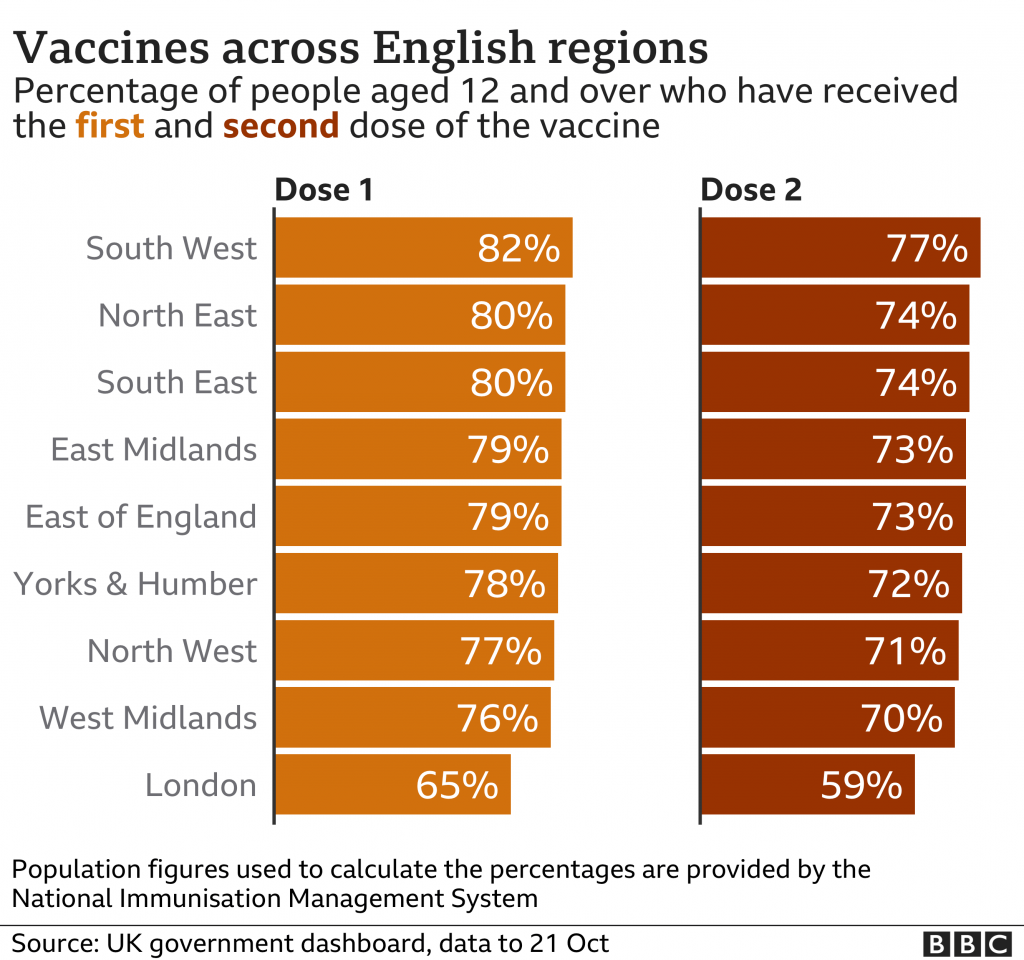
COVID-19 booster vaccine
Booster vaccine doses will be available on the NHS for people most at risk from COVID-19 who have already had 2 doses of a vaccine. This includes:
- people aged 50 and over
- people who live and work in care homes
- frontline health and social care workers
- people aged 16 and over with a health condition that puts them at high risk of getting seriously ill from COVID-19
- carers aged 16 and over
- people aged 16 and over who live with someone who is more likely to get infections (such as someone who has HIV, has had a transplant or is having certain treatments for cancer, lupus, or rheumatoid arthritis)
- People who are pregnant and in 1 of the eligible groups can also get a booster dose.
Most people will be offered a booster dose of the Pfizer/BioNTech vaccine or Moderna vaccine. This means your booster dose may be different from the vaccines you had for your 1st and 2nd doses. Some people may be offered a booster dose of the Oxford/AstraZeneca vaccine if they cannot have the Pfizer/BioNTech or Moderna vaccine.
You’ll be offered a booster dose at least 6 months plus 1 week after you had your 2nd dose. If you have been contacted by the NHS, you can book your COVID-19 booster vaccine dose online at NHS website.
COVID-19 vaccine for Children in the UK aged 12 to 15
Children aged 12 to 15 are being offered 1st dose of a COVID-19 vaccine (Pfizer) to help limit further disruption to their education. So far, 15% of 12-15 year olds in England have received one shot.
People aged 16 and over, in England, can now find their nearest centre through the ‘grab a jab’ NHS online walk-in finder.
Flu Vaccines
Chief Executive of the UK Health Security Agency Dr Jenny Harries said: People who get COVID-19 and flu at the same time are twice as likely to have serious health consequence or die.
Those eligible (most people who can get a COVID-19 booster vaccine are also eligible for the annual flu vaccine) for the free flu vaccine and a COVID-19 booster jab are urged to book their appointments as soon as possible.
You can have the NHS flu vaccine at:
- your GP surgery
- a pharmacy offering the service
- your midwifery service if you’re pregnant
- a hospital appointment
COVID-19 has not gone away so it’s important we remain cautious. Halloween and Bonfire Night are two festivals where we sometimes meet people we don’t normally meet so it is important to follow safer behaviours as these times in particular.
- Let fresh air in
- Test regularly
- Use face coverings in crowded indoor places
- Use the COVID-19 NHS Ap
- Wash your hands regularly
- Stay at home when you feel unwell
______________________________________________
每月疫情更新: 2021年10月
I.疫情应对路线图
最近的疫情感染人数一直在上升。 到目前为止,政府没有采取更严格的防疫B 计划。政府目前的重点还是新冠第三针加强疫苗的接种,鼓励更多的年轻人(包括 12-15 岁)接种疫苗。
在什么情形下会启动防疫B计划?
出现个别疫情状况或感染数字达到某个程度,不会立即启动防疫B 计划,但政府表示将实时监控以下3个方面:
• 住院人数
• 感染数字的迅速变化
• NHS 系统的总体状况
10 月 21 日来自内阁办公室网络发布会的关键信息
• 随着冬天的临近,民众须遵循更安全的社交行为,每个人负责的行为对疫情防护至关重要。
• 如果您符合条件,请尽快接种新冠第三针加强疫苗。
• 有关疫苗的假消息很可能会使民众产生误导,破坏防疫的努力,民众需要知道真实的疫苗相关信息。
自 9 月学校开学以来的疫情信息:
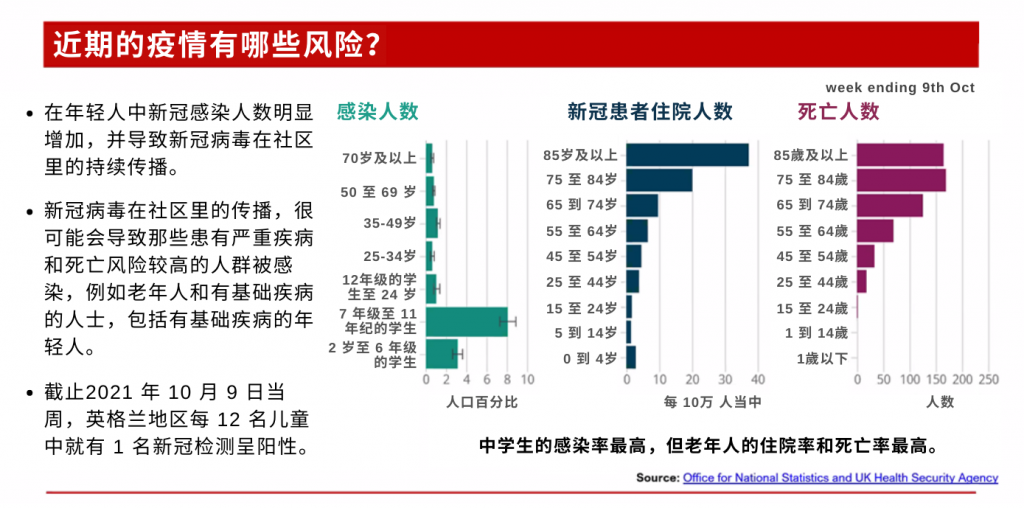
自从学校返校以来,青少年感染新冠的人数一直保持在高位。 在最近一周,近一半的病例发生在 20 岁以下的人群。 然而,老年人的重病和住院率仍然较高。 这意味着学校和大学是主要的传播渠道,非常危险的是年轻人将病毒带回家,并传染给年长的家庭成员。
II. 检测与自我隔离的规定
从 10 月 24 日起,从红色名单以外的国家抵达英格兰,已接种完全接种两剂新冠疫苗的乘客,可以在抵达的第二天或之前进行LFT快速检测。
如果家中有学生/孩童检测新冠呈阳性时,该怎么办?
政府鼓励所有学生自行在家进行每周两次的LFT快速新冠检测。
• 新冠检测呈阳性的学生必须在家隔离 10 天。
• 学生本人 – 或其父母 – 将被要求提供所有密切接触者的详细信息。
• 被指定为密切接触者的学生将被要求进行 PCR 新冠核酸检测。 如新冠检测呈阴性,则不需要进行自我隔离。
III. 疫苗接种
新冠疫苗接种
在整个英格兰地区中,西南地区12岁及以上的人士中,已有82%接种了至少一剂疫苗,而West Midland(伯明翰所在地区)为 76%。
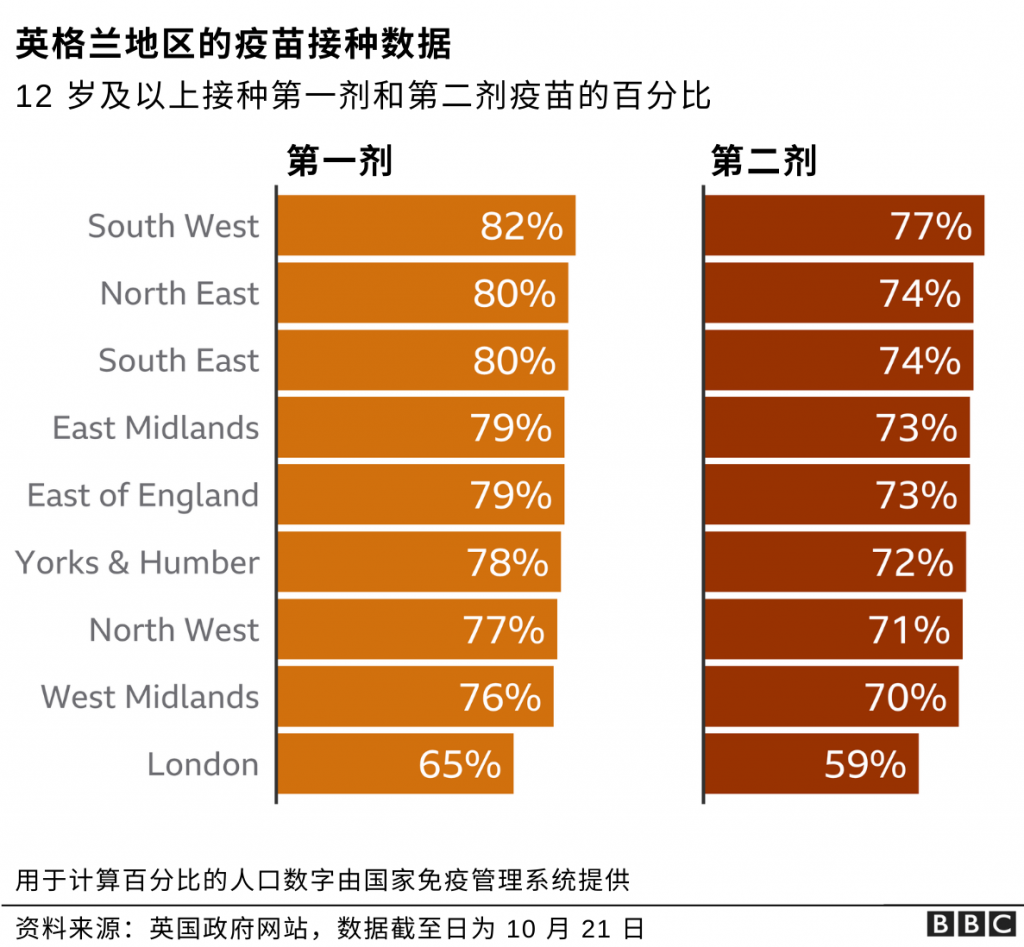
第三针新冠加强疫苗
NHS 将为已经接种两剂新冠疫苗的高风险人士提供第三剂加强疫苗,包括:
- 50岁以上的人士
- 养老院的老人以及工作人员
- 一线医护工作者和社会护理工作者
- 16 岁及以上有基础健康问题,属新冠易感高风险的人士
- 16 岁及以上的照料者
- 16 岁及以上与属新冠高风险的人一起同住的人士(新冠高风险的人群包括艾滋病患者、接受过移植手术或正在接受某些癌症、狼疮或类风湿性关节炎治疗的人士等)
- 符合以上条件之一的孕妇也可以获得新冠加强疫苗
大多数人将获得辉瑞/BioNTech 或摩德纳/Moderna 加强疫苗,这意味着您的加强疫苗可能与您接种的第一剂和第二剂新冠疫苗会有不同。 如果某些人士无法接种辉瑞或摩德纳疫苗,他们可能会给与牛津/阿斯利康疫苗的作为加强疫苗。
在您接种第二剂新冠疫苗后至少 6 个月 1 周后,您将可以获得第三针加强疫苗,如果 NHS 已与您联系,您可以在 NHS 网站上在线预订疫苗接种。
12 至 15 岁青少年新冠疫苗接种
政府正在向 12 至 15 岁的青少年提供第一剂新冠疫苗(辉瑞)的接种,旨在减少疫情对学生教学的影响。 到目前为止,英格兰 12 至 15 岁的青少年中已有 15%接种了第一剂疫苗。
在英格兰,16 岁及以上的人士可以通过 NHS 网站搜索grab a jab,查询离他们最近的疫苗接种中心。
流感疫苗
英国卫生安全局首席执行官珍妮·哈里斯博士说:同时感染新冠病毒和流感的人士,出现严重健康后果或死亡的可能性会加倍。
符合接种新冠加强疫苗和流感疫苗的人士(大多数符合接种第三针新冠加强疫苗的人士,也有资格免费接种流感疫苗),请尽快预约您的疫苗接种。
您可以在以下地点接种 NHS 流感疫苗:
- 您的家庭医生
- 提供流感疫苗接种服务的药房
- 如果您怀孕了,您的助产服务机构
- 医院预约
新冠病毒尚未消失,因此我们仍需谨慎。‘万圣节’和‘篝火节之夜’这两个节日,我们会在聚集的人群里,遇到很多陌生人,因此遵守更安全的社交行为至关重要。
- 经常通风,呼吸新鲜空气
- 定期进行新冠快速检测
- 在无法保持社交距离的室内场所佩戴口罩
- 使用新冠手机应用程序
- 经常洗手
- 如出现身体不适时,请呆在家里。

